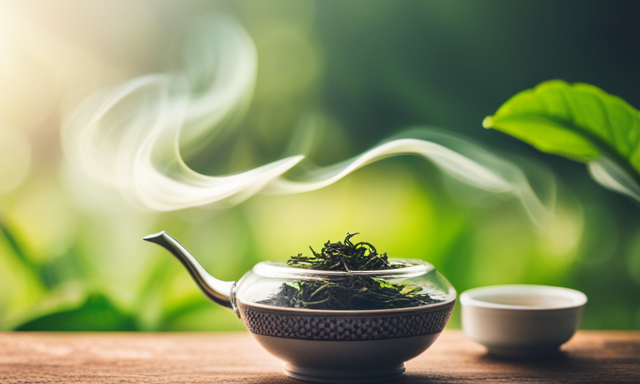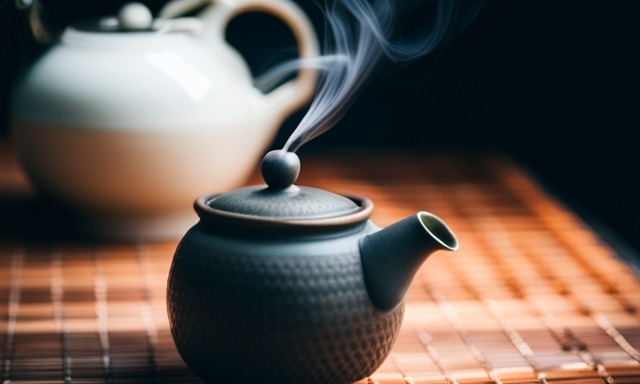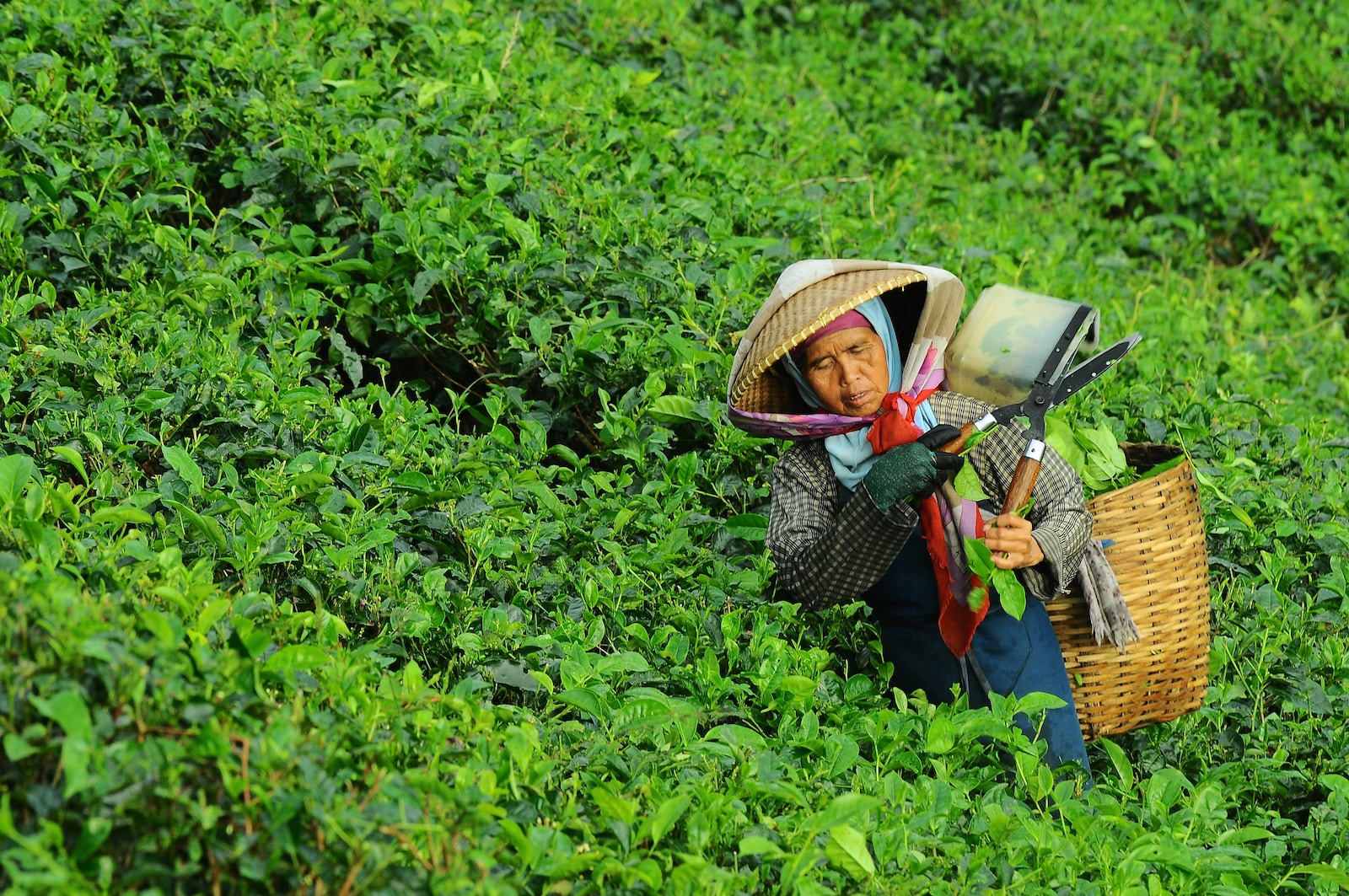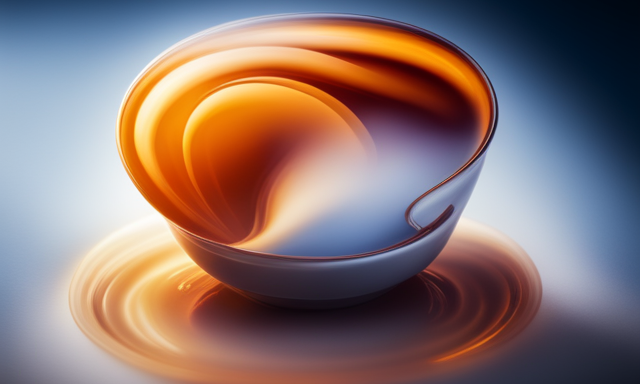As I sit here, savoring the delicate aroma and exquisite taste of a warm cup of tea, I can’t help but wonder: which tea is truly superior?
Is it the vibrant and grassy green tea, the bold and robust black tea, or the nuanced and complex oolong tea?
Join me on a journey of exploration and discovery as we delve into the characteristics, taste profiles, and health benefits of each of these teas. We will uncover the secrets behind their unique flavors and unravel the mysteries of their ancient origins.
Together, we will navigate the vast world of tea, uncovering the best brews to suit our individual preferences.
So, whether you’re a tea connoisseur or just starting your journey, prepare to be enlightened as we embark on a quest to find the ultimate winner among green, black, and oolong tea.
Key Takeaways
- Green tea has a moderate caffeine content and a light, grassy flavor, while black tea has a higher caffeine content and a bold, robust flavor.
- Oolong tea has a moderate caffeine content and a complex, floral flavor, and it also offers various health benefits such as strengthening tooth enamel, aiding in weight loss, and improving cardiovascular health.
- Each type of tea requires different water temperatures and steeping times for optimal preparation.
- Personal preference plays a crucial role in determining the preferred choice of tea, and the best way to discover it is by trying all three teas and experimenting with different blends.
Characteristics of Green Tea
You’ll love the refreshing taste and vibrant color of green tea, making it a perfect choice for those seeking a light and invigorating beverage. Green tea is renowned for its high levels of antioxidants, which help protect the body against free radicals and promote overall health.
Not only is green tea delicious, but it also offers numerous benefits, including aiding in weight loss. The antioxidants found in green tea can boost metabolism and increase fat oxidation, making it a popular choice for those looking to shed a few pounds.
Additionally, green tea contains catechins, a type of antioxidant that’s been shown to have anti-inflammatory and anti-cancer properties.
As we move on to discuss the characteristics of black tea, you’ll see how it differs from green tea in both taste and health benefits.
Characteristics of Black Tea
Indulging in a cup of black tea is like sipping on a warm embrace from a dear friend. Black tea, known for its bold and robust flavors, offers a delightful experience for tea enthusiasts. Its deep amber color and rich aroma create an inviting ambiance, making it a perfect companion for a cozy afternoon.
To fully enjoy the wonders of black tea, here are five characteristics and brewing techniques to keep in mind:
- Full-bodied flavor with hints of malt and caramel.
- High caffeine content for an energizing boost.
- Versatile tea that can be enjoyed plain or with milk and sugar.
- Steeped for 3-5 minutes in boiling water for optimal flavor extraction.
- Ideal for pairing with breakfast foods and desserts.
As we transition to exploring the characteristics of oolong tea, let’s delve into its nuanced flavors and brewing methods.
Characteristics of Oolong Tea
Transitioning to the world of oolong, get ready to savor the delicate notes and brewing techniques that bring out its exquisite flavors. Oolong tea is a traditional Chinese tea known for its unique characteristics that fall between those of green and black tea. Its flavor profiles vary widely depending on the oxidation level, ranging from floral and fruity to woody and roasted. To fully appreciate the complexity of oolong tea, it is essential to master the art of brewing it. The brewing techniques involve using water at specific temperatures and steeping times to extract the perfect balance of flavors. As shown in the table below, different oolong teas require different brewing parameters to achieve optimal results.
| Oolong Tea Type | Water Temperature | Steeping Time |
|---|---|---|
| Floral Oolong | 185°F | 3-4 min |
| Fruity Oolong | 200°F | 2-3 min |
| Roasted Oolong | 205°F | 4-5 min |
Transitioning to the subsequent section about comparing taste profiles, we will explore how oolong tea stacks up against green and black tea.
Comparing Taste Profiles
To truly appreciate the nuances of each tea’s taste profile, you’ll find that oolong, with its delicate floral and fruity notes, presents a unique flavor experience when compared to its counterparts.
The flavor profiles of different tea varieties are influenced by various factors. Green tea, known for its grassy and vegetal taste, is lightly oxidized, allowing it to retain its natural freshness. On the other hand, black tea undergoes full oxidation, resulting in a robust and malty flavor. Oolong tea falls somewhere in between, with a partially oxidized process that yields a complex taste with hints of honey and orchid. The level of oxidation, the terroir of the tea leaves, and the brewing method all contribute to the final taste.
Transitioning into the subsequent section about the health benefits of green tea, it’s important to note that taste is not the only factor to consider when choosing the perfect cup of tea for yourself.
Health Benefits of Green Tea
Did you know that incorporating green tea into your daily routine can improve your overall health and well-being, potentially reducing the risk of chronic diseases like heart disease and cancer? Green tea is rich in antioxidants called catechins, which have been shown to have numerous health benefits. These include reducing inflammation, boosting metabolism, and improving brain function. Studies have also suggested that drinking green tea may help lower cholesterol levels and blood pressure, leading to a decreased risk of heart disease. In addition, the high levels of polyphenols in green tea have been linked to a reduced risk of various types of cancer.
| Benefit | Description |
|---|---|
| Antioxidants | Green tea contains high levels of antioxidants, which help protect the body against damage from free radicals. |
| Weight Loss | The catechins in green tea have been found to boost metabolism and aid in weight loss. |
| Brain Function | Some studies have shown that the compounds in green tea can improve brain function and enhance memory and concentration. |
Now, let’s explore the health benefits of black tea.
Health Benefits of Black Tea
When it comes to the health benefits of black tea, there are several key points to consider. First and foremost, black tea is known for its positive effects on digestive health and immune system support.
Additionally, it has been shown to improve focus and mental alertness, making it a great choice for those looking to enhance their cognitive abilities.
Lastly, black tea has been linked to oral health and cavity prevention, making it a smart choice for maintaining a healthy smile.
Digestive health and immune system support
Not only does oolong tea provide a delicious and refreshing taste, but it also offers digestive health benefits and supports a strong immune system. It’s important to note that oolong tea offers even more benefits beyond digestive health and immune support. When it comes to weight management, oolong tea plays a significant role. It contains antioxidants called catechins that help boost metabolism and promote fat oxidation, aiding in weight loss.
Additionally, oolong tea has been shown to have a positive impact on gut health. It contains polyphenols that support the growth of beneficial bacteria in the gut, improving digestion and reducing the risk of gastrointestinal issues. These digestive health benefits, combined with oolong tea’s immune-boosting properties, make it an excellent choice for overall wellness.
As we transition into the next section about improved focus and mental alertness, it’s important to note that oolong tea offers even more benefits beyond digestive health and immune support.
Improved focus and mental alertness
With its ability to enhance cognitive function and increase mental clarity, oolong tea becomes a powerful elixir for those seeking improved focus and heightened mental alertness. The unique combination of caffeine and L-theanine in oolong tea provides a gentle and sustained energy boost without the jitters or crash commonly associated with other caffeinated beverages. Studies have shown that the polyphenols found in oolong tea can improve cognitive performance, memory, and attention span. Additionally, the tea’s natural antioxidants help protect the brain against age-related decline and oxidative stress. To illustrate the benefits of oolong tea, consider the following comparison table:
| Green Tea | Black Tea | Oolong Tea |
|---|---|---|
| Moderate caffeine content | Higher caffeine content | Moderate caffeine content |
| Light, grassy flavor | Bold, robust flavor | Complex, floral flavor |
| High in antioxidants | High in antioxidants | High in antioxidants |
As we transition to the next section on oral health and cavity prevention, it’s important to note that oolong tea also offers benefits beyond mental alertness.
Oral health and cavity prevention
Maintaining good oral health and preventing cavities can be easily achieved by incorporating oolong tea into your daily routine. Oolong tea is known for its numerous health benefits, and its positive effects on oral health are no exception.
One of the key factors in maintaining oral health is the importance of fluoride. Oolong tea naturally contains fluoride, which helps to strengthen tooth enamel and prevent tooth decay.
Additionally, oolong tea can play a significant role in cavity prevention by reducing the formation of plaque and inhibiting the growth of harmful bacteria in the mouth. Unlike other teas that may contain high levels of sugar, oolong tea is sugar-free, making it a healthier option for your teeth.
By incorporating oolong tea into your daily routine, you can enjoy the benefits of improved oral health and cavity prevention. Transitioning into the subsequent section about the health benefits of oolong tea, it’s important to note that its positive impact extends beyond just oral health.
Health Benefits of Oolong Tea
Indulging in a cup of oolong tea can provide a plethora of health benefits, making it a wise choice for those seeking a delicious and beneficial beverage. Here are three reasons why oolong tea is a great addition to your daily routine:
-
Weight Loss: Oolong tea contains compounds that can help boost metabolism and aid in weight loss. It can also help regulate blood sugar levels, reducing cravings for sugary snacks.
-
Heart Health: Oolong tea is rich in antioxidants and polyphenols, which can help reduce the risk of heart disease. It can also lower bad cholesterol levels and improve overall cardiovascular health.
-
Mental Alertness: Oolong tea contains caffeine and L-theanine, which can improve focus, concentration, and mental alertness. It provides a gentle energy boost without the jitters often associated with coffee.
With these health benefits in mind, let’s now explore how to choose the best tea for your preferences.
Choosing the Best Tea for Your Preferences
When it comes to selecting the perfect tea for your tastes, it’s fascinating to note that over 3,000 different varieties of tea exist worldwide. Choosing tea flavors can be a delightful adventure, as each type offers its own unique characteristics and aromas.
Green tea, with its fresh and grassy flavor, is known for its high antioxidant content and potential health benefits.
Black tea, on the other hand, boasts a bold and robust taste that pairs well with milk and sugar, making it a popular choice for breakfast.
Oolong tea falls somewhere in between, with partially fermented leaves that create a smooth and mellow flavor profile.
Finding the right tea blend is all about experimenting and discovering what suits your palate best.
In the next section, we will explore brewing and serving tips to enhance your tea experience.
Brewing and Serving Tips
To enhance your tea experience, try experimenting with different brewing and serving techniques to create a visually appealing and aromatic cup of your preferred blend. Here are a few tips to help you get started:
-
Water temperature: Use different water temperatures for each type of tea. Green tea should be brewed with water around 175°F, while black tea requires boiling water at 212°F. Oolong tea falls in between, needing water at about 195°F.
-
Steeping time: Steeping time can vary depending on personal preference and tea type. Green tea should be steeped for 1-2 minutes, black tea for 3-5 minutes, and oolong tea for 2-3 minutes.
-
Tea to water ratio: Use about one teaspoon of tea leaves for every 8-ounce cup of water. Adjust the amount according to your taste preference.
-
Serving suggestions: Consider serving your tea in clear glass or porcelain cups to showcase the color and clarity. Pair your tea with light snacks like biscuits or fruit for a delightful experience.
Now that you’ve mastered the art of brewing and serving tea, let’s move on to the ultimate winner in the battle of green, black, and oolong teas.
Conclusion: The Ultimate Winner
So, now that you’ve learned all the tips and tricks, let’s find out who emerges as the ultimate champion in the green, black, and oolong tea showdown. After conducting a taste test and considering expert opinions, it’s clear that each tea has its own unique qualities and appeal.
| Tea Type | Taste | Expert Opinion |
|---|---|---|
| Green Tea | Light and refreshing with a grassy flavor. | Experts appreciate its high antioxidant content and health benefits. |
| Black Tea | Bold and robust with a malty flavor. | Known for its strong taste and energizing properties. |
| Oolong Tea | Balanced and complex with fruity and floral notes. | Valued for its smoothness and ability to enhance digestion. |
While all three teas have their merits, it ultimately comes down to personal preference. If you enjoy a lighter and more refreshing option, green tea might be your go-to. For those seeking a bold and robust flavor, black tea is the way to go. And if you prefer a balanced and complex taste, oolong tea won’t disappoint. So, try them all and discover which one reigns supreme in your own tea journey.
Frequently Asked Questions
What is the caffeine content in each type of tea?
The caffeine content in each type of tea varies. Green tea generally contains less caffeine than black tea, while oolong tea falls in between. However, it’s important to note that the health benefits of each tea differ as well.
Can I mix different types of tea together for a unique flavor?
Mixing tea flavors can be a delightful experiment, offering a unique flavor profile. However, it’s important to consider compatibility and balance. Additionally, exploring the health benefits of blended teas can provide a holistic approach to wellness.
Are there any specific brewing techniques for each type of tea?
There are specific brewing techniques for each type of tea. Green tea should be brewed at a lower temperature for a shorter time, while black tea requires higher temperature and longer steeping. Oolong tea falls in between. It’s important to choose the flavor that suits your taste buds.
Can drinking tea help with weight loss?
Tea, a hidden gem for weight loss, acts as a symbolic elixir. It not only boosts metabolism but also offers numerous health benefits. Sip on this magical potion to witness its transformative powers.
Are there any potential side effects of drinking green, black, or oolong tea?
Excessive consumption of green, black, or oolong tea can lead to potential side effects such as insomnia, increased heart rate, and digestive issues. The processing method does not significantly affect the health benefits of tea.
Conclusion
After carefully considering the characteristics, taste profiles, and health benefits of green, black, and oolong tea, it’s with a heavy heart that I must declare a winner.
While all three teas have their merits, the ultimate champion is… water. Yes, my dear tea enthusiasts, the irony lies in the fact that the purest, simplest beverage triumphs over the complexity of tea.
So, let’s not forget the importance of hydration and the beauty of simplicity amidst the sea of tea choices. Cheers to water, the unsung hero of beverages!










